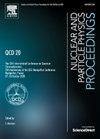在量子计算机上实现少数体 QCD
Q4 Physics and Astronomy
Nuclear and Particle Physics Proceedings
Pub Date : 2024-10-08
DOI:10.1016/j.nuclphysbps.2024.10.001
引用次数: 0
摘要
量子计算机是模拟多体系统的理想工具,其中 QCD 因其丰富的现象学而脱颖而出。每次模拟都从编码开始,在此我们成功地回顾了基于寄存器和粒子之间的识别而新开发的紧凑编码;量子存储器被划分为多个寄存器,每个寄存器都有一个与编码粒子自由度数量相关的希尔伯特空间。这样,对于自由度较高的低数量粒子,我们就能比直接编码获得指数级的压缩。举例来说,我们将这种编码应用于双寄存器存储器,并实现了反不对称和指数算法。本文章由计算机程序翻译,如有差异,请以英文原文为准。
Towards few-body QCD on a quantum computer
Quantum computers are promising tools for the simulation of many-body systems, and among those, QCD stands out by its rich phenomenology. Every simulation starts with a codification, and here we succently review a newly developed compact encoding based on the identification between registers and particles; the quantum memory is divided into registers, and to each we associate a Hilbert space of dimension the number of degrees of freedom of the codified particles. In this way we gain an exponential compression over direct encodings for a low number of particles with many degrees of freedom. As an example we apply this encoding on a two-register memory and implement antisymmetrization and exponentiation algorithms.
求助全文
通过发布文献求助,成功后即可免费获取论文全文。
去求助
来源期刊

Nuclear and Particle Physics Proceedings
Physics and Astronomy-Nuclear and High Energy Physics
CiteScore
0.40
自引率
0.00%
发文量
0
期刊介绍:
Nuclear and Particle Physics Proceedings is the premier publication outlet for the proceedings of key conferences on nuclear and high-energy physics and related areas. The series covers both large international conferences and topical meetings. The newest discoveries and the latest developments, reported at carefully selected meetings, are published covering experimental as well as theoretical particle physics, nuclear and hadronic physics, cosmology, astrophysics and gravitation, field theory and statistical systems, and physical mathematics.
 求助内容:
求助内容: 应助结果提醒方式:
应助结果提醒方式:


